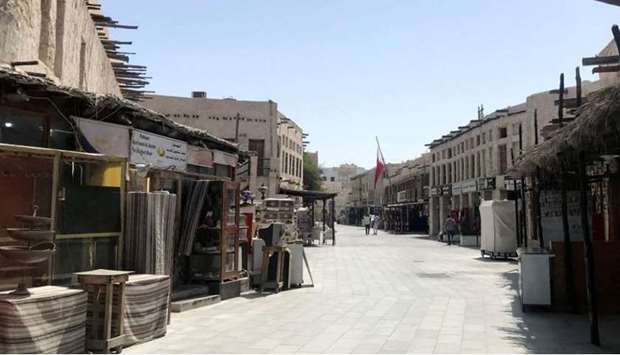Qatar’s economic recovery is gaining pace due to a range of factors, including energy price recovery, which has been ahead of analyst estimates, PwC said in its ‘Qatar Economy Watch’ report.
According to PwC, Qatar’s economy experienced some challenges throughout 2020 and the first half of 2021, due to the dual shock of the drop in oil prices and the impact of the pandemic, which led to an overall decline in economic output of -3.7%.
Qatar has faced its share of hardships, but has shown resilience, and is emerging from the Covid-19 crisis in a strong position, PwC said. Rapid vaccinations have brought the pandemic under control locally, with leading indicators in 2021 showing signs of a robust recovery.
However, the recovery is gaining pace due to a range of factors, including energy price recovery, which has been ahead of analyst estimates.
Qatar’s LNG sector is positioned for growth with LNG spot prices surpassing $12 in Asia in late June, the highest since 2014, excluding a brief spike in January when they increased to record levels.
Moreover, the main contracts for implementing the North Field East LNG expansion were awarded in February indicating that investment activity will pick up and provide a timely boost to the economy.
Another positive driver for growth is the decision by Qatar’s neighbours to restore relations at the Al Ula summit in Saudi Arabia in January 2021. This has significantly de-risked the economy and is reviving bilateral commercial opportunities, including aviation and the 2022 World Cup, according to the report.
Leading indicator points to sustained growth: The commonly accepted standard measure of economic activity known as the purchasing managers index (PMI), which is produced from a monthly survey of major companies, has recently shown expansionary trends in private sector non-oil GDP.
Qatar averaged 54 during Q1, on a scale where a reading over 50 indicates economic growth. Even with lockdowns in April 2021, the PMI still remained in growth territory at 51.5.
Bassam Hajhamad, PwC country senior partner and consulting leader in Qatar, said, “As a result of extensive efforts taken by the Government, Qatar has shown resilience and emerged stronger from the pandemic. But more is being done to re-define economic growth models and ensure the country is increasingly competitive in the post-pandemic world.
“This would require a holistic transformational agenda that relies on citizen-centric approach, domestic value chains and private sector competitiveness, fiscal resilience and innovation, participatory and agile governance.”
In the short term, next year’s World Cup will be a key driver of recovery and diversification as well as the startup of Qatar’s new LNG trains from 2025, PwC noted.
In addition, Qatar's government will continue accelerating the execution and impact of its economic diversification strategy, across six key transformational themes: diversification and private sector development; fiscal management and innovation; digitisation; glocalisation and talent attraction; value creation; energy transition and sustainability.
Each of these themes, PwC said, will be vital for driving the post-pandemic economy and creating a sustainable future for the nation.
According to PwC, Qatar’s economy experienced some challenges throughout 2020 and the first half of 2021, due to the dual shock of the drop in oil prices and the impact of the pandemic, which led to an overall decline in economic output of -3.7%.
Qatar has faced its share of hardships, but has shown resilience, and is emerging from the Covid-19 crisis in a strong position, PwC said. Rapid vaccinations have brought the pandemic under control locally, with leading indicators in 2021 showing signs of a robust recovery.
However, the recovery is gaining pace due to a range of factors, including energy price recovery, which has been ahead of analyst estimates.
Qatar’s LNG sector is positioned for growth with LNG spot prices surpassing $12 in Asia in late June, the highest since 2014, excluding a brief spike in January when they increased to record levels.
Moreover, the main contracts for implementing the North Field East LNG expansion were awarded in February indicating that investment activity will pick up and provide a timely boost to the economy.
Another positive driver for growth is the decision by Qatar’s neighbours to restore relations at the Al Ula summit in Saudi Arabia in January 2021. This has significantly de-risked the economy and is reviving bilateral commercial opportunities, including aviation and the 2022 World Cup, according to the report.
Leading indicator points to sustained growth: The commonly accepted standard measure of economic activity known as the purchasing managers index (PMI), which is produced from a monthly survey of major companies, has recently shown expansionary trends in private sector non-oil GDP.
Qatar averaged 54 during Q1, on a scale where a reading over 50 indicates economic growth. Even with lockdowns in April 2021, the PMI still remained in growth territory at 51.5.
Bassam Hajhamad, PwC country senior partner and consulting leader in Qatar, said, “As a result of extensive efforts taken by the Government, Qatar has shown resilience and emerged stronger from the pandemic. But more is being done to re-define economic growth models and ensure the country is increasingly competitive in the post-pandemic world.
“This would require a holistic transformational agenda that relies on citizen-centric approach, domestic value chains and private sector competitiveness, fiscal resilience and innovation, participatory and agile governance.”
In the short term, next year’s World Cup will be a key driver of recovery and diversification as well as the startup of Qatar’s new LNG trains from 2025, PwC noted.
In addition, Qatar's government will continue accelerating the execution and impact of its economic diversification strategy, across six key transformational themes: diversification and private sector development; fiscal management and innovation; digitisation; glocalisation and talent attraction; value creation; energy transition and sustainability.
Each of these themes, PwC said, will be vital for driving the post-pandemic economy and creating a sustainable future for the nation.




